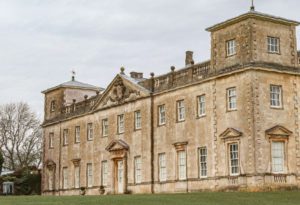“Here is a good old mansion house…”
By the mid 19th century the Palladian mansion house at Lydiard Tregoze was a little the worse for wear. Generations of St John’s had chosen to spend their declining fortunes on racehorses, fine porcelain and grand tours rather than a bit of DIY and the ancestral home was beginning to show its age. Radical politician
William Cobbett rode through the parish in September 1826 and later wrote:
‘Here is a good old mansion-house and large walled-in garden and a park, belonging, they told me, to Lord Bolingbroke. I went quite down to the house, close to which stands the large and fine church. It appears to have been a noble place; the land is some of the finest in the whole country; the trees show that the land is excellent; but, all, except the church, is in a state of irrepair and apparent neglect, if not abandonment.
The house had served as a holiday home for the family for close on 150 years. Despite a major make over in the early 18th century subsequent St Johns had elected to live in London close to where the action was, popping back to Wiltshire for a spot of shooting and partying. By the 1830s Henry, 4th Viscount Bolingbroke, was renting out the house and parkland. His wife, Maria, Lady Bolingbroke was in Aberystwyth at the time of her death in 1836 and Henry was in Scotland at the time of his in 1851.
So, who was living in a house like this?
Not any old family, but one that had family connections to the St Johns. At the time of the 1841 census Thomas Orby Hunter was the tenant at Lydiard House with his daughter and son-in-law Charles and Charlotte Orby Wombwell and their baby daughter.
On June 6, 1841 the servants’ quarters was pretty much full with sixteen members of staff living in on census night and a further three recorded in the stables. Most gave their birthplace as out of the parish, so presumably Thomas brought his own staff with him.
Ten years later and Charles Orby Wombwell had taken over the tenancy. He had cut down on the indoor servants but there were still an impressive eleven in residence on census night, including a governess, butler, housekeeper, cook, kitchen maid, two housemaids, a nursemaid, a footman and a groom. This time there were more local folk on the pay roll – Elizabeth Hiscocks, the daughter of Lydiard gamekeeper Robert Hiscocks, Ann Dobson from Lydiard Tregoze, Richard Weeks from neighbouring Lydiard Millicent and Jesse Turner who would later become butler to Lord Bolingbroke. The censuses, which provide a snapshot in time, also provide so much information and insight into the lives of those who lived and worked at Lydiard.
